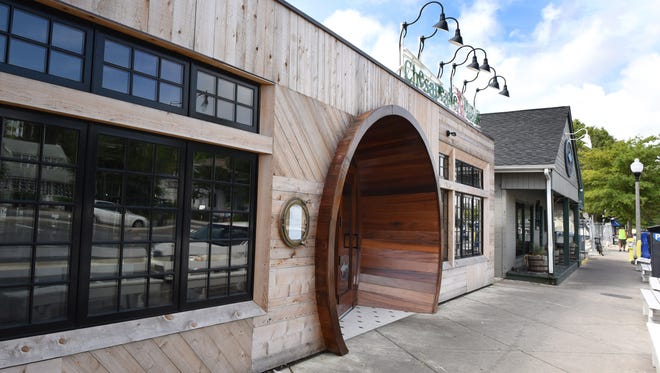Rehoboth restaurant size restrictions draw criticism

After months of deliberation, the Rehoboth Beach commissioners have agreed on restaurant size limits.
Eateries that serve alcohol within the city will now be allowed 2,500 square feet of seated dining area and 500 square feet of bar area, with no limits on storage or kitchen space. This is a change from the previously allowed 5,000-square-foot total — an area regulation that had been in effect for two decades and was hotly contested during August meetings.
Commissioner Toni Sharp said the ordinance will give restaurant owners, "flexibility."
"They can create their space how they want and need, without the box they were previously limited to," she said.
The ordinance also regulates brewpubs, dining establishments which make, bottle and sell alcohol on site. Such establishments will only be allowed to produce up to 4,000 barrels of beer per year.
Dogfish Head, the city's only brewpub which got its start on Rehoboth Avenue 21 years ago, will be grandfathered.
The company took a leading role in working with city officials to craft the ordinance and succeeded in striking a measure that would have prevented brewpubs from wholesaling beer for tasting events.

To some, the new ordinance means nothing.
Dozens of established restaurants downtown are happy with their current floor plans — many do not even have the room to expand.
Joe Baker, co-owner of Henlopen City Oyster House, said he felt the ordinance was, "more than agreeable," and was pleased that city officials reached out to the business community for feedback.
Carol Everhart, president and CEO of the Rehoboth Beach-Dewey Beach Chamber of Commerce, contacted 58 restaurant owners in August regarding the ordinance. Of the 29 responses she received, "80 percent did not agree with the 5,000-square-foot-total size cap," which was in place at the time.
"Many didn't think the restriction was fair," she said.
READ MORE: Popular Bluecoast Seafood to open 2nd location in Rehoboth
Although council passed new legislation, some still feel officials missed the mark.
"You make your money in the dining room," said Jeff Hamer, local restaurateur. "Not by having a massive kitchen or a walk-in."
Hamer owns several restaurants in downtown Rehoboth Beach, including Fins Fish House & Raw Bar and Claws Seafood House. He was hoping to expand Claws, but the new legislation killed that dream.
"It's just not going to happen," he said. "The amount of money I would have to put into the renovations and bringing the building up to code wouldn't be worth it. Not to mention, the project would hardly be an expansion. Thanks to the ordinance, the dining room can only be 2,500 square feet. I'm already about there."
Hamer said the money needed to expand would be better spent on opening a new location elsewhere.

"I love this city — it's where my family is, it's where I have chosen to build a life," he said. "But the passing of this legislation was a sad day in Rehoboth's history."
Pete Borsari, owner of The Pond Bar & Grill, said the ordinance will also alter his future plans.
"I'm still going to expand," said Borsari, who has been in business on 1st Street for nearly 15 years. "But now I'll have to re-evaluate."
In addition to restrictions on barrel production, only 50 percent of a new brewpub's floor space can be designated to brewing. Microbreweries and craft distilleries are not permitted.
RELATED:Rehoboth Beach seafood treasure opens in Berlin
Under the new law, brewpubs are also prohibited from creating any offensive brewery-related airborne or waterborne emissions, and are required to obtain a supplemental permit of compliance from the city.
At the Aug. 8 mayor and commissioners morning workshop, Mayor Sam Cooper strongly opposed brewpubs, saying that, essentially, Dogfish Head was the exception. Even so, the money-making powerhouse was forced to relocate operations to Milton in 2014.
Cooper argued that such "manufacturing companies," will attract a younger, rowdier crowd, and encourage corruption, crime and disorderly conduct in the streets. With so many residences backing up to businesses within the one-square-mile town, Cooper said his goal is to ensure brewpubs are primarily restaurants.

Many restaurant owners feel the ordinance is another attempt made by city council to tighten its control on the growth of the resort town. Whether it's growing homes, a growing number of summer visitors, or restaurant growth, it's never a word too far away from the lips of residents or town officials.
"Once again, the working man gets stiffed," said Hamer.
Although several residents have voiced opinions on the new code, that it stifles adaptation and growth, and could potentially lead to economic failure, commissioner Sharp said it was passed to keep the area safe and is for the greater good of all of the businesses.
"Restaurants are the backbone of Rehoboth, there's no doubt that people travel here for the restaurants," she said. "Placing certain limitations on them does not hurt any in particular, but it does help create a level playing field. Our priority is safety and maintaining the town's image."
On Twitter @hcarroll_1
On Instagram @thesassy_banana